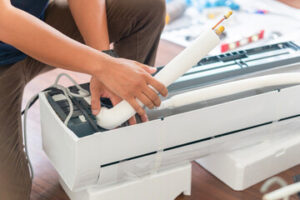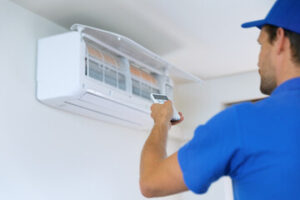A thorough inspection of your air conditioner can reveal any problems. A professional technician can then repair or replace any parts to restore the system to normal.

Capacitors, which are responsible for turning on the fans and compressors, can also wear out. A failure of these can result in an AC system that won’t turn on.
The cooling system in our homes is more than a machine that blows cold air. It’s an intricate dance of components that regulate both temperature and humidity to ensure our comfort. AC repair focuses on ensuring each of these components can do their job without interruption. Identifying and addressing problems early on, such as a short cycling or strange noises, helps keep your AC running well and minimizes future damage.
A basic understanding of your AC’s refrigeration cycle can help you determine why your system may be struggling. The process converts the refrigerant between gas and liquid, a critical step that requires several components to work together in harmony. If any one of these components is malfunctioning, the entire process may be disrupted. To prevent these issues, it’s important to perform routine maintenance and inspections.
While many of these issues can be identified with simple diagnostic tools, a professional will have the advanced equipment necessary to address them correctly. In addition to traditional diagnostic tests, technicians can use thermal imaging cameras to pinpoint problems within your system. The cameras detect differences in temperature, which can help identify blockages or refrigerant leaks.
One common problem that’s easy to overlook is a lack of cool air flowing from your vents. Usually, this is due to a dirty filter, but it can also indicate that the system is low on refrigerant or that it needs to be cleaned. If the problem persists, you can try resetting your thermostat or checking the circuit breaker to see if it has tripped.
Another common issue is short cycling, which occurs when the internal compressor chamber gets too hot and safety components shut it off. This puts a heavy strain on the system and can lead to further damage if it happens repeatedly.
Finally, it’s important to check that all return and supply vents are clear of furniture, toys, drapes and other items. This can limit the flow of air and cause it to slow down, causing your system to struggle to cool your home. In some cases, this can be solved by simply cleaning the ductwork and ensuring all vents are open.
Cleaning the Evaporator Coil
The evaporator coils in your AC system are responsible for dehumidifying the air that passes over them. The coils also have the job of converting the liquid refrigerant back into its liquid state so that it can cycle back into the compressor and begin the cooling process again. This is a vital step in the process of cooling your home or business, and it can only happen if the coils are free from dirt and debris.
Dirt on the coils inhibits heat transfer and causes your system to work harder than it should to maintain a cool temperature. Fortunately, it only takes a few minutes to clean the coils if you do it regularly. A little preventative maintenance goes a long way toward keeping your AC working well and saving you money on power bills in the long run.
Before you start the cleaning process, make sure the system is turned off and that your circuit breaker is shut off for safety reasons. It’s also a good idea to close any vents in the room that you’re going to be working on. Next, you’ll want to access the evaporator coil. Depending on your system type, this may be easy or difficult to do. A closet/upflow system will have an accessible coil, while a gas or heat pump system may require you to open an access panel on the air handler.
Once you’ve gained access to the coils, remove any dust or dirt from the surface using a damp cloth or a hose nozzle with a low water pressure. If you’re using chemical cleaners, read the label and follow the directions to ensure proper care of your system.
Finally, take a comb or wire and comb the aluminum fins on the coil to straighten them if they’re bent. This will help improve air flow and reduce the chances of future damage to the coil.
You should also clean the drain line in your air conditioning unit regularly to prevent clogs and leaks. Adding a capful of bleach to the line once a year helps keep it clear of any debris that might accumulate. A clogged drain line can cause your AC to overheat and can lead to costly repairs in the future.
Adding More Refrigerant
While a number of AC repair issues can be addressed by homeowners, there are some that require professional expertise. This is especially true for issues that involve dangerous chemicals and equipment. The most common example of this is an air conditioner with a refrigerant leak. In this scenario, addressing the leak is vitally important. This is because the leakage of refrigerants into the atmosphere has serious consequences. First of all, it leads to higher electricity bills and strains the system, reducing its lifespan. Secondly, the gases are not environmentally friendly, and can contribute to global warming.
A HVAC pro can address a leak in several ways. One option is to add more refrigerant, which is known as recharging the system. The other option is to find and fix the leak. This involves examining the condenser coil and looking for signs of a leak, including ice buildup on the coils and a low refrigerant level. It is crucial that the technician locate and fix the leak before adding more refrigerant to the system.
Refrigerants are a dangerous chemical that needs to be handled carefully. If an HVAC technician is not experienced working with these chemicals, he or she could be injured or even killed. This is why it’s always a good idea to call in an expert.
Another important aspect of AC repair is to clean the condenser coil. The coil is the site where heat is released into the air, so it’s essential that it is free from any dirt or debris that might interfere with this process. In addition, the coil must be free from ice to ensure it functions optimally.
Finally, the HVAC technician will also inspect the blower and fan components to make sure they are in good condition. These are the components that move the air through the ducts and vent it outside, and they are essential for keeping the house comfortable. A faulty blower or fan can lead to a sweltering home and can be dangerous for individuals with respiratory conditions.
The benefits of AC repair go far beyond a cool living environment. Addressing small problems in a timely manner reduces the stress on the system, extending its lifespan and saving you money on electricity costs. Keeping the system in optimal condition helps safeguard the health and safety of your family and friends, and reduces the risk of health issues like asthma and allergies.
Replacing the Contactor
When a contactor stops working properly, it can cause other problems with your AC system. Fortunately, replacing it is a relatively straightforward process that can be completed by most homeowners. However, a trained technician can provide the necessary expertise to ensure that your AC unit is cooling correctly once the replacement has been made.
Air conditioning is more than just a machine that blows cold air; it’s an intricate system designed to regulate both temperature and humidity. In order for an air conditioner to function, it uses a refrigeration cycle that converts liquid refrigerant into gas and back again. This cycle must be carefully monitored and maintained in order to avoid damage to the system.
While air conditioning repair services can address the most common AC issues, routine maintenance is essential for preventing future problems and extending the lifespan of your system. Performing regular maintenance can also help you save money on energy bills and lower your energy consumption.
Before any work is performed on the AC unit, it is important to make sure that the power to the system is completely off. This can be done by locating the circuit breaker that controls the unit and switching it off. This will prevent any accidental electrical shock while working on the contactor. It’s also a good idea to wear appropriate protective gear such as gloves and safety glasses. Lastly, you should make sure that the area around the AC unit is well-ventilated.
Whether you’re experiencing a faulty capacitor or an ineffective AC contactor, a malfunctioning air conditioner can have serious health repercussions. Extreme temperatures can strain the human body’s ability to cool itself, leading to excessive sweating and dehydration. This can be especially dangerous for vulnerable groups, such as the elderly and young children.
While it is possible to perform some simple AC repairs, such as resetting a contactor or cleaning the condensate drain, it’s best to leave these tasks to a trained professional for safety and reliability reasons. In addition to ensuring that the job is done correctly, they can also provide a complete inspection of the AC system and suggest any additional repairs.
